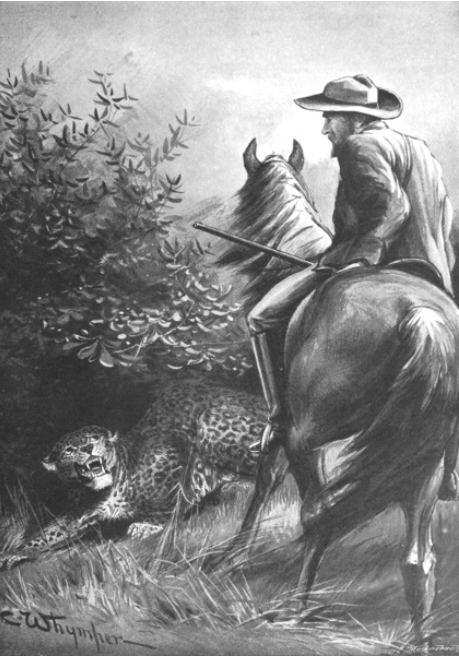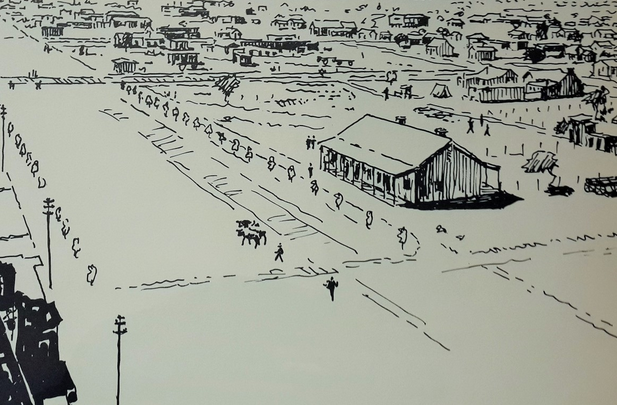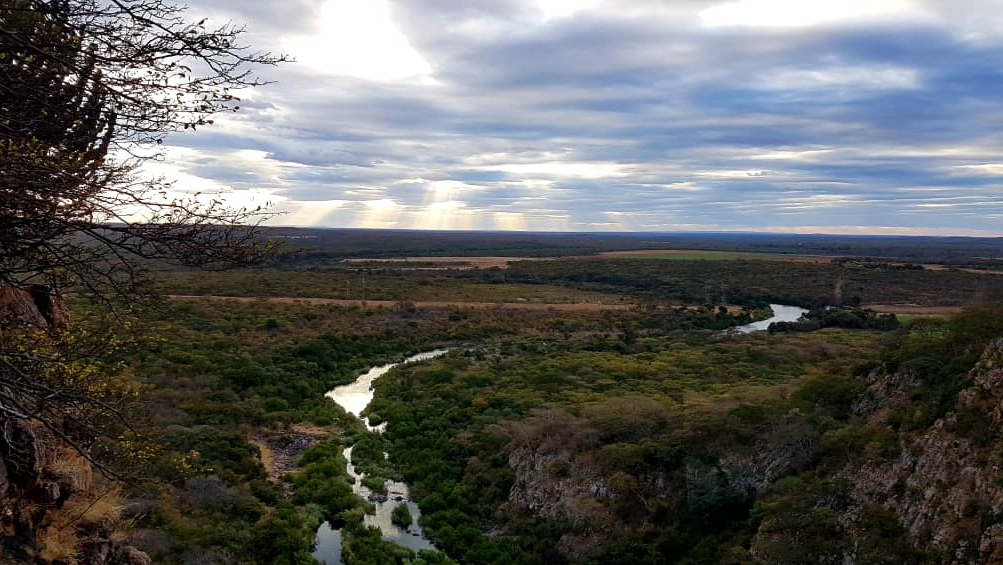Editor’s Note: The following comprises the first chapter of Sunshine and Storm in Rhodesia, by Frederick Courteney Selous (published 1896). All spelling in the original.
(Continued from previous chapter)
CHAPTER I
When, in the end of December 1893, immediately after the close of the first Matabele War, I rode away from Bulawayo and set out on my journey to England, I thought it more than probable that I should never again revisit the land over which Lo Bengula had so lately held sway. Destiny, however, willed it otherwise. Perhaps I found that the definition of “enough” as “a little more than you’ve got,” when applied to income, was a true one; or perhaps I thought the ways of civilisation somewhat irksome, and at times pined for “a breath of the veld” and one more look at the wild game in the wild country where I had already passed so many years of my life. At any rate, when I was asked by my old friend, Mr. Maurice Heany, to go out once more to Matabeleland to assist him in the management of a land and gold-mining company which he had recently floated, I gave the proposal my very serious consideration, and when I found that my wife was quite willing to face all the troubles and difficulties incidental to a life in a new country, I agreed to undertake the duties required of me for a period of two years.
We—my wife and I—left England for South Africa on 30th March 1895, but we did not reach Bulawayo until the end of the following August; as, after landing at Cape Town, we spent two months in the Cape Colony and the Orange Free State, and then taking ship round the coast to Beira, proceeded by river steamer to Fontesvilla, and thence by rail to Chimoio. Here my waggon was awaiting us, and in it we travelled slowly and comfortably for two months, keeping the main transport road—which I had myself laid out four years before—to Salisbury, but from there going across country to my old hunting camp on the Hanyani river; thence to Hartley Hills on the Umfuli, and from there along the old hunters’ road to Bulawayo. On this portion of our route I found game very plentiful, especially sable antelopes, large herds of which beautiful animals I saw almost daily. Near the river Sewhoi-whoi I was able to take my wife quite close up to the largest herd of these antelopes that I have ever seen. As they cantered past us within a hundred yards I counted them roughly and made their number between seventy-five and eighty. Having plenty of meat at the waggon I had no need to shoot; so we just sat on our horses and admired them, though there was one cow with a beautiful curved pair of horns that tempted me sorely. On several occasions we saw the fresh spoor of lions, but we never either got a sight of the animals themselves or even heard one roar. At the Sebakwe river I saw the tracks of a herd of elephants that had passed only a few days before; and on this same day I met with rather a curious experience, which, although I am not writing an article on shooting incidents, I will take the liberty to relate.

Early on the morning of the day in question I had left the waggon and ridden down to the river—the Sebakwe—intending to follow its course to the point at which the road crossed it. Having plenty of meat, I took no native attendants with me, and resolved not to shoot at anything but a small antelope, a wild pig, or some animal the greater part of which I could have carried behind my saddle. However, I saw no game at all, large or small, with the exception of one reed buck ram bounding through the long grass, and was approaching the ford across the river without having fired a shot, when I noticed what I took to be a jackal sitting on its haunches in the grass about a hundred and fifty yards to my right. The grass being rather long I could not make out very well what it was even from my horse’s back, and when I had dismounted I could barely see that there was anything there at all. However, aiming rather low in the grass, I fired, and distinctly heard the bullet strike something with a loud thud. Remounting my horse, and marking by a small bush the spot near which the now invisible animal had been before I fired, I rode leisurely up to see what I had shot. I was carrying my rifle across the saddle in front of me, without having reloaded it, and on nearing the bush I had marked pulled up my horse and was looking about for a jackal lying dead on the ground. However I could not see one, and was wondering how such a small animal could have moved away after being hit by an expanding bullet, when a loud grunting noise made me look up, and I saw a leopard rushing towards me through the grass. As it only charged from a distance of fifteen yards, it was close to me before I could even swing my rifle over the horse’s neck, and I made sure that it would spring upon him and bite and claw him badly before I could load and shoot. However, strange to say, it simply galloped past, almost, if not quite, brushing against my horse’s fore-leg, and passing beneath my right stirrup. After going about thirty yards it stopped and sat down on its haunches. By this time I had another cartridge in my rifle; so I hastily dismounted and gave the leopard a shot behind the shoulder, killing it instantly. It proved to be a large female in good condition, with a beautifully-marked skin. The first bullet had struck it in the middle of the body, and going right through, had made a large hole on the further side, out of which a portion of the liver was protruding. This was of course sufficient to account for the animal’s display of bad temper; but why it simply rushed past me without springing on to the horse, I don’t quite know. Had my horse turned, possibly it would have done so; but being an animal of a very imperturbable temper he never moved, and his immobility may have disconcerted the leopard, and caused it not to act quite up to its original intention. After disembowelling it, I lifted it on to my horse, and carried it behind the saddle to the ford across the Sebakwe, where I found my waggon outspanned. This very mild adventure is the only incident of interest which I have to record as having occurred on our journey to Bulawayo, which we finally reached on 20th August.
When just twenty months previously I had left Matabeleland, there was no other Bulawayo save a ruined kraal, but lately wrecked and destroyed by the order of the unhappy Lo Bengula, who in despair at the defeat of his bravest regiments, had blown up his European house, burnt his chief town to ashes, and abandoning the land won by his father’s assegais to the victorious troopers of the Chartered Company, fled away to die heart-broken in the forests to the north. Just across the stream which runs below the kraal stood the camp of the white invaders, a rough, hardy lot of men, whom some have called heroes and others filibusters; a confusion of titles equally applicable, I fancy, to the followers of Drake or Clive or any other body of men who have helped to make the British Empire what it is. The site of the new township had indeed been marked out, but not a house of any kind stood upon it. In the short interval, however, a European town had sprung up, containing many good, substantial buildings, whilst the bustle and movement in the dusty streets gave an air of life and vigour to the new Bulawayo, which is very commonly absent from the frontier towns of South Africa. In short, at this time—the autumn of 1895—everything was apparently couleur de rose in Matabeleland. Properties, whether farm lands, building sites in town, or mining claims, went up to very high values, whilst almost every one believed that within a year Bulawayo would contain a population of 5000 souls, and that the town itself would receive a plentiful supply of water from the reservoirs already in course of construction, and be lighted by the electric light. In fact, all was mirth and joy and hope in the future; for what was to hinder the ever-increasing prosperity of the country? Much good work had already been done on many of the reefs, and on the whole the promise was distinctly good. Then again, after a probation of eighteen months, the country had been pronounced favourably upon by Dutch and Colonial farmers, especially for cattle-ranching, whilst many predicted that much of the high veld would carry sheep.
Apparently no difficulties with the natives were to be apprehended, and certainly were not foreseen, as no one could have recognised the identity in the quiet submissive native carrying nothing but a stick, to the arrogant savage of old times who was seldom seen without his shield and assegais, and who was usually insolent and brutal in his manner to the white man. No one dreamt that within a very few months the country would be well-nigh overwhelmed in calamity; that that terrible scourge the rinderpest, which has swept like a destroying angel from Masailand through Central and Eastern Africa, almost annihilating in its course all bovine animals as well as all the various and beautiful species of antelopes, was creeping ever nearer to the Zambesi river, and was destined ere long to cross that boundary, and travelling ever southwards destroy tens of thousands of cattle in Matabeleland, thereby paralysing its transport service, and rendering the cost of living almost prohibitive in a country separated by 600 miles of wilderness from the nearest railway station. Still less, looking at the submissive behaviour of the natives, did any one picture to himself in the furthest recesses of his mind, the vision of homesteads burned to ashes throughout Matabeleland, and around them the corpses of their owners, among them many women and tender children, all brutally murdered, lying unburied in their blood. Yet were these dire disasters, with partial drought and plague of locusts superadded, soon to crush all joy out of Matabeleland.

In spite of its air of prosperity and the light-heartedness of its inhabitants, Bulawayo with its constant dust-storms, scarcity of water, and general burnt-up appearance, had but few attractions either for my wife or myself, and we made our arrangements to get away to our Company’s property of Essexvale as soon as possible. On this property a rough two-roomed house of poles, plastered with mud and thatched with grass, had been got ready for us temporarily, pending the arrival of a wire-wove bungalow that had been sent out from England in sections, and which was to be erected on a site chosen by myself. On our way to Essexvale we spent a night with my old friends the missionaries at Hope Fountain, and I had a long talk over old times, and the present condition of the natives in Matabeleland. Mr. Helm told me that although doubtless the members of the royal family, and the men of position under the old regime, regretted the downfall of their king and the conquest of the country by the white man, yet the great mass of the people acknowledged that they were better off under the rule of the Chartered Company than they had been in Lo Bengula’s time; for although individual white men were sometimes guilty of injustice and brutality towards individual natives, yet, speaking generally, the lives and property of the latter were now secure, and whatever they earned was their own, all of which blessings were unknown to them before the conquest of Matabeleland by the white man.
There was, however, one matter, Mr. Helm informed me, that was causing a great deal of discontent throughout the country. This was the periodical taking away of the cattle in small numbers by the Chartered Company, subsequent to the first confiscation immediately after the war. Probably if, after the subjugation of the country, the Chartered Company had at once taken all the cattle they ever intended to take, and given the natives the balance for their very own to do with as they liked, there never would have been any heart-burning over the cattle question at all. However, after the first confiscation, all the remaining cattle in the country—about 90,000—were branded with the Company’s brand and left with the natives to look after. They were told that the Company would take more from time to time as they required them, but at the same time they were given to understand that only cattle which had belonged to the king would be confiscated, and none belonging to private owners interfered with. This promise was made under the belief that nearly all the cattle in Matabeleland had belonged to the king, and that the private owners had been but few in number. That this was a mistake I think there can be little doubt, as almost every man of any standing in Matabeleland had been a cattle-owner, some of the chief Indunas possessing large herds of private cattle. But when a native commissioner received an order from the Government to send to Bulawayo without delay a certain number of cattle from his district, he never could have done so had he listened to all the claims made to private ownership previous to the war, some of which were true, but others false; and he therefore had to use his own discretion in selecting the cattle necessary to make up the total required. In this way certain natives suffered wrong, more especially owners of perhaps only three or four cows, who in some cases lost their all, both in cattle and faith in the honesty and justice of the Government of the Chartered Company, which they deemed had broken the promise given to them, as indeed was the case, though the mistake was made inadvertently and through not considering the investigation of the whole question of sufficient importance to take any great trouble about.
“If,” said Mr. Helm, “the Company would take, once for all, all the cattle they intend taking, and give the natives the remainder, it would restore their confidence, as they now believe that the cattle will be constantly taken away from them in small lots until there are none left to them. However,” he continued, “the Company can do what it likes with them, and treat them generously or otherwise as it pleases, for they acknowledge themselves to be a conquered people, and will submit to any terms imposed upon them.” This remark was made by a man who had lived in close intimacy with the natives of Matabeleland for twenty years, but as subsequent events show, it was far from the truth. Shortly after this conversation, the Government of the Chartered Company, acting on the advice I believe of the chief native commissioner, Mr. Herbert Taylor, decided to finally settle the cattle question. There were at this time about 70,000 head of cattle in the hands of the natives, and of this number the Government determined to take two-fifths, leaving the remaining three-fifths as the absolute property of the Matabele. A meeting was called at Bulawayo, at which all the chief Indunas in the country were present, and when the proposition was laid before them, they expressed themselves as thoroughly satisfied, and assured Mr. Taylor that their people would also be satisfied; and from my own subsequent observation, I believe that this final distribution of the cattle caused a general feeling of relief throughout the country, and, in the district in which I was living at any rate, the people seemed well contented with this settlement of the question, which left them for the most part fairly well off.










More things to add to the reading list. Thanks a lot Mantel!
5